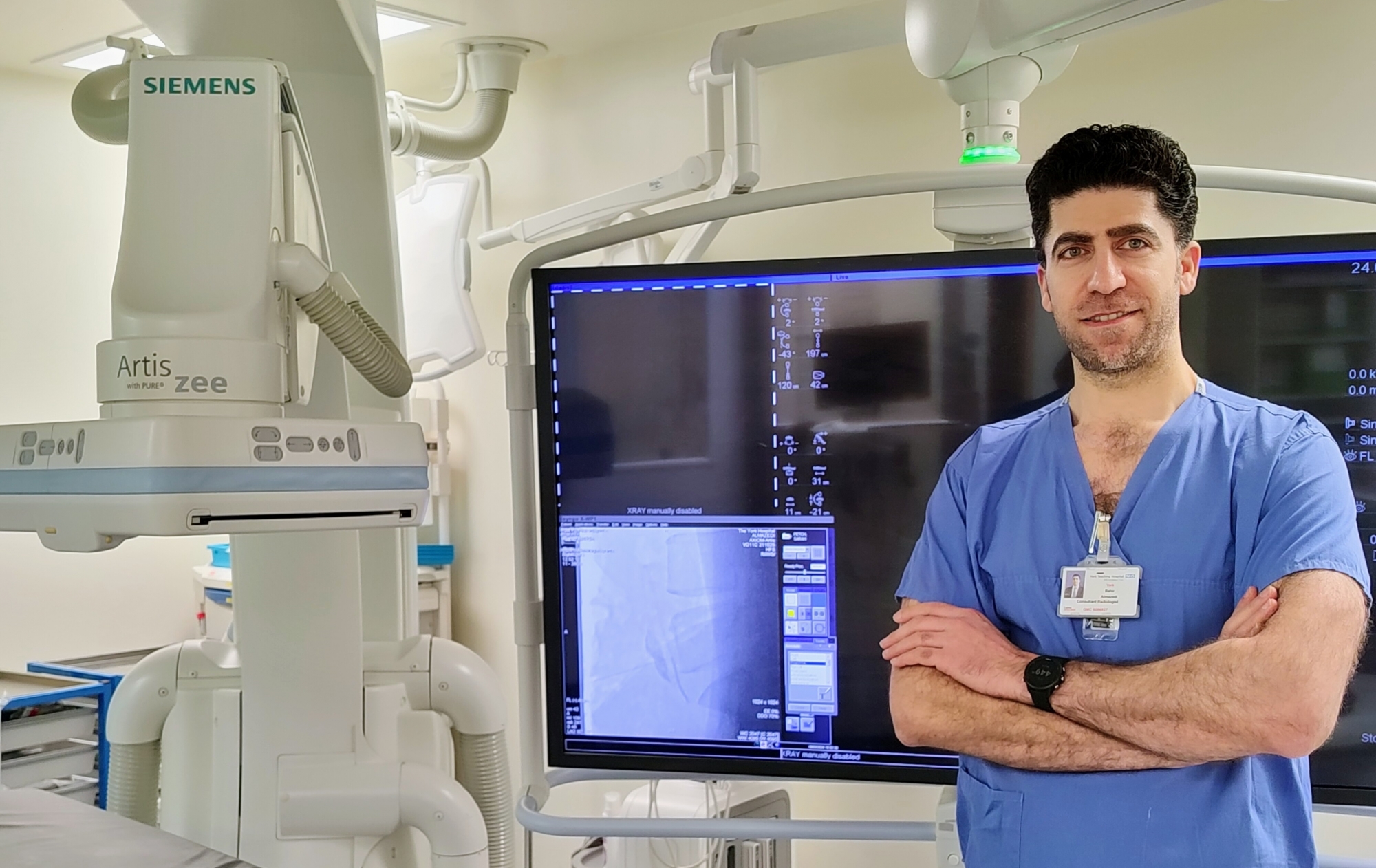In this section
Trust study finds improved pain management strategy for women undergoing fibroid treatment

02 May 2024
A York team of interventional radiologists has studied a new alternative for pain management for women undergoing image-guided fibroid treatment.
The new technique is used during fibroid embolisation (image-guided uterine preserving treatment) at York Hospital and could pave the way nationally for improving the experience and recovery of women who undergo this treatment for uterine fibroids which is a common condition with troubling symptoms of heavy periods, pain, and pressure.
A case-control study, led by Dr. Bahir Almazedi, on this new image-guided pain control technique (superior hypogastric nerve block) delivered during uterine fibroid embolisation took place at the Vascular Imaging Unit. It evaluated the impact on women during and after the fibroid treatment. It compared the outcome of patients who have had the nerve block and those who did not. The findings were published earlier this year in a leading scientific radiology journal, which marks the first publication of its kind in the UK.
Dr. Bahir Almazedi, a consultant vascular and interventional radiologist, who works in the Radiology Department and Vascular Imaging Unit where he conducted the clinical study said the nerve block technique would allow treatment of the condition as a day case, so women can go home on the same day of their treatment saving precious hospital beds.
Before introducing this technique back in 2016, women who were treated for uterine fibroids with embolisation had a short stay in hospital and faced a longer recovery time.
The Interventional Radiology team has treated more than 300 Trust patients suffering from uterine fibroids with embolisation which is a minimally invasive technique. It involves a tiny puncture in the groin and uses a small catheter and wire under X-ray guidance to deliver tiny particles that block the fibroid blood supply and shrink the fibroids.
Interventional Radiologists use minimally invasive techniques to treat a wide variety of other conditions including the treatment of bleeding in trauma, bleeding from the bowel, treatment of kidney, and liver tumours, the repair of aortic aneurysms, and to treat blocked arteries and veins all over the body. The clinical outcomes of more than 120 women were reviewed for this research study undertaken at York Hospital. It assessed the impact of the nerve block during uterine fibroid embolisation for patients since its introduction in 2016. Through this method, the team discovered the nerve block can offer a safe and effective pain management solution improving patient experience. It also found that women were significantly less likely to be admitted overnight.
Reflecting on the study, Dr. Almazedi explained: “I’m really pleased we were able to find a solution to this challenging issue. To see the huge difference that this has made to so many women undergoing fibroid embolisation treatment makes all the hard work that went into developing this technique very worthwhile indeed.
“This pain management solution has improved patient experience immensely and will help alleviate the anxiety associated with this uterine preserving image-guided treatment option for fibroids making this state-of-the-art treatment more attractive for patients and clinicians and in so many cases sparing women the need to have a hysterectomy.”
Women who have been given the nerve block as part of their care reported significantly less pain from the fibroid embolisation procedure and were able to be discharged on the same day, making the procedure more cost-effective for the NHS.
Fibroids are common, with around two in three women developing at least one fibroid at some point in their life. They most often occur in women aged 30 to 50. They can cause heavy menstrual bleeding, period pain, pelvic pressure, and bladder irritation, and sometimes infertility.
Dr. Almazedi, who has worked across the world including spells in Canada and Iraq, is now hoping these results can help influence the treatments offered to women suffering from fibroids across the NHS. Bahir and his team have given numerous talks at national and international conferences on the research findings.
He has trained and proctored interventional radiologists in neighbouring hospitals to perform this nerve block technique which they since incorporated into their practice improving patient experience further afield across Yorkshire.
He added: “I am planning to film the nerve block technique to use as an educational resource for training, with the long-term aim of a national rollout for maximum benefit to women undergoing fibroid embolisation across the country.”






